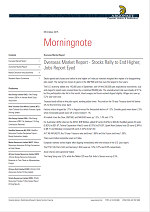Market Update & Important Indicators:
U.S. stocks climbed Monday, rebounding in the wake of Friday's rout that ended two months of summer calm. The recovery came after the Dow industrials and the S&P 500 closed at their lowest levels since July 7 on Friday, down roughly 3% from their records, amid investor concerns that central banks around the world were running out of willingness or ability to prop up markets. The S&P 500 was on track Monday for its biggest gain since July 8. Investors weighed comments from various Federal Reserve officials ahead of the central bank's self-imposed blackout period, which begins Tuesday, ahead of their next policy meeting Sept. 20-21. While statements last week raised concerns that the Fed could tighten policy faster than expected, some of those worries abated Monday. Janet Yellen, said Monday economic conditions warrant debate about raising rates at the central bank's meeting next week, adding officials don't face an urgent need to act immediately. Several traders and analysts said Fed officials hadn't significantly altered rate increase expectations and central bank concerns provided an excuse for some investors to move from positions acquired as major U.S. indexes climbed to record highs this summer. In European markets, the Stoxx Europe 600 shed 1%.
Asian shares started the week notably weaker as fears of a possible U.S. interest-rate increase gripped markets, with investors assessing the potential impact on growth. After U.S. stocks on Friday posted the biggest declines since the initial post-Brexit drops, following a summer devoid of volatility in equities trading there. Hong Kong's Hang Seng Index skidded 3.3% to 23310.3, the biggest drop since February. The Shanghai Composite shed 1.9%, finishing at a 1-month low and the Nikkei Stock Average ended down 1.7%. Korea's Kospi, which notched its largest decline in two months Friday, topped that with a 2.3% decline. Monday's weakness in Asian stocks was accompanied by sizable drops in commodities and pressured the equities of such companies.
Australian shares sank to their lowest levels in more than nine weeks in a broad sell-off Monday as investors considered global growth and fresh signs central banks could retreat from easy-money policies. In the sharpest retreat for the market since the U.K. voted to exit the European Union, the S&P/ASX 200 dropped 119.6 points, or 2.2%, to finish at 5219.6. The sour start to the week comes after the index fell for the last four weeks running. Markets across the region faltered, tracking tumbling U.S. stocks and bonds on Friday, as the Dow Jones Industrial Average and S&P 500 notched up their biggest percentage losses since the initial Brexit selling. The Australian equities market has underperformed in recent weeks thanks to a high aggregate dividend yield relative to other developed markets, making it vulnerable to higher interest rates. With Monday's fall, the ASX 200 has handed back gains so far this year, down 1.4% since the start of 2016.
Copper for delivery in three months closed up 0.3% at $4,648/t on the London Metal Exchange. Among other base metals, aluminium was down 0.6% at $1,550/t, zinc was down 1.3% at $2,251/t, lead was down 1.0% at $1,873/t, tin was down 1.4% at $19,085/t, and nickel was down 2.8% at $10,033/t.
Recent Contacts & Presentations:
Orecorp Limited (ORR), Dimerix Limited (DXB), Genesis Minerals Ltd (GMD), Dakota Minerals Ltd (DKO), Breaker Resources NL (BRB), Bard1 Life Sciences Ltd (BD1), Alto Metals Ltd (AME), Birimian Limited (BGS), Antipa Minerals Ltd (AZY), Vault Intelligence Ltd (VLT), Noxopharm Ltd (NOX), Gage Roads Brewing Co. (GRB), West African Resources (WAF), Cedar Woods Properties Ltd (CWP), Sino Gas & Energy Holdings Ltd (SEH), Salt Lake Potash Ltd (SO4), Kalina Power Ltd (KPO), Austal Limited (ASB), Agrimin Ltd (AMN), Stavely Minerals Ltd (SVY), MGC Pharmaceuticals Ltd (MXC), Vital Metals Ltd (VML), Tox Free Solutions Ltd (TOX), Swick Mining Services Ltd (SWK), Davenport Resources Ltd (DAV)


